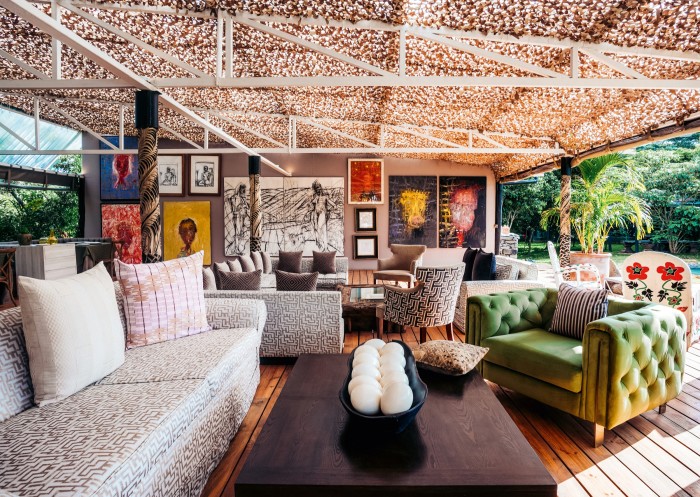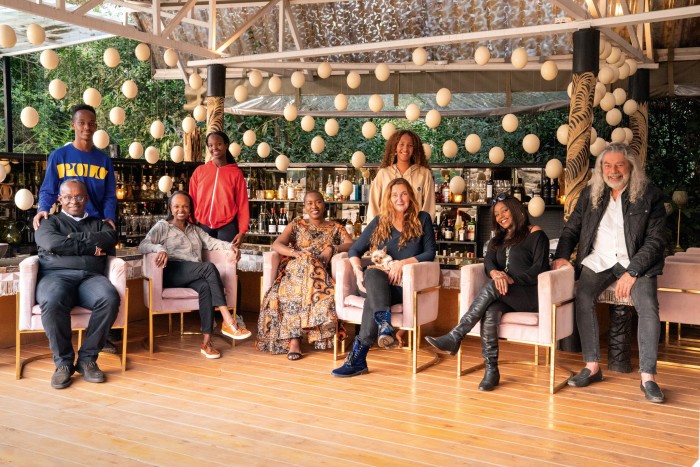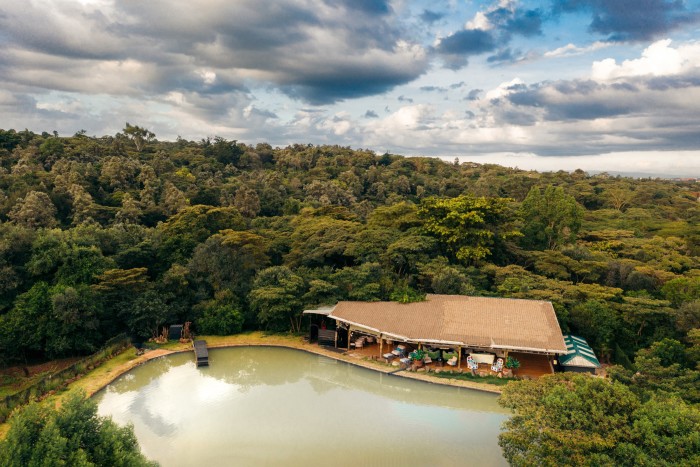My Eden project: inside Anna Trzebinski’s Nairobi sanctuary

Roula Khalaf, Editor of the FT, selects her favourite stories in this weekly newsletter.
If Eden – the new Nairobi address that is equal parts hotel, urban sanctuary and artistic hub – feels like a home, that’s probably because it once was one. Anna Trzebinski, the German-born, Kenyan-raised fashion designer, and her late husband, Tonio Trzebinski, built it by hand almost 30 years ago, as newlyweds in their 20s. The coffee tables are salvaged wood from a sunk dhow that washed up while Tonio was surfing on their honeymoon. There are collages on the walls by Peter Beard, a friend and neighbour, depicting the artist Francis Bacon and the Queen.
Trzebinski has packed a lot of life into half a century: two fathers, two husbands (Tonio died in a headline carjacking-murder case in 2001; her former second husband is a Samburu warrior and guide), the opening and closing of a bush camp, three children. Her meticulous embellished accessories have been taken up by brands such as Paul Smith and Donna Karan. “I am 56, and independent Nairobi is 58 years young,” she tells me. “We are growing up together.”


Turning her family home into a hotel wasn’t exactly in the game plan, but nor does it lack sense entirely. “The extraordinary thing is that bringing together all the threads of my life here has set me free,” she says. “This feels like a new beginning.”
The idea for Eden and its philanthropic spin-off, the Eden Project, took shape last year through conversations Trzebinski had with her friend and neighbour, the celebrated artist Wangechi Mutu. “We had long talks about what matters most to us now, living in contemporary Kenya,” says Trzebinski of Mutu, whose work has been exhibited everywhere from Tate Modern to the Pompidou to the Metropolitan Museum of Art, and whom Trzebinski calls an “informal mentor and champion”. Both women had felt a change in Nairobi, both before and during the pandemic: “For the first time in years, as many of the expats left, the traffic slowed, the skies cleared, and we could see – further than we have, literally, since childhood,” says Mutu. “It became possible to think about the meaning of home, outside of it being a physical place; like, do we know who we are, as Kenyans?”


Trzebinski spent much of the pandemic in firefighting mode, dealing with the collapse of her incomes. An existing rental contract was suddenly terminated on her home, and lockdown put a block on the trunk shows that sustain her niche couture company. So she auctioned her entire stock online, at cost, raising cash to keep her all-female artisanal team afloat. “No one lost her job; no one took a salary cut,” says Trzebinski. “We have worked together for three decades, given birth together, married, educated our kids together, buried husbands together.” In six months, the team (more used to embellishing exquisite suede coats) helped transform Eden’s handful of buildings from a family home into a creative sanctuary and arts hub that might offer a new kind of hospitality. They sewed the mosquito nets, painted the butterfly murals that connect the communal areas, polished the hardwood floors, and draped sand-coloured netting across the signature fibreglass terrace roofs to filter sunlight.
Nine bedrooms have been carved out from the various spaces and filled with mementoes and the ephemera of a travelling life. A “woman-made” borehole and lake provide a water source for the professional kitchens, and the showpiece deck is wrapped in four acres of permacultured garden.


“This was never about heads on beds en route to safari,” Trzebinski says of her ambitions for Eden, which she sees as part political forum and part arts club, a place for locals to convene and engage with the topics of the day, national and global. “I was so encouraged when people such as my former boss, Richard Leakey, and the activist Kathy Eldon bought into the idea of the place.” Eldon is providing sponsorship through her US-based setup, Creative Visions. Under its aegis, Trzebinski says, the Eden Project hosts regular monthly discussion panels with diverse parties – events that “bust stereotypes about age, race, religion and gender”.
I get a taste of the Project’s possibilities as a social-impact platform a few days later. When night falls it is like a theatre curtain, sudden and dramatic; the fires and candles are lit and the place comes to life. At the bar, above which ostrich eggs dangle like giant earrings, is a disparate group of people: artists, conservationists, politicos, food gurus and financiers. Excepting Kofi Annan’s son and Peter Kinyua, head of the Rhino Ark fund (whose gig this evening’s event is), this is a female powerhouse. There’s Emmy-award winning producer Sigrid Dyekjaer, straight off a plane from the Cannes Film Festival. Triple Michelin-starred chef Dominique Crenn, arm linked with her fiancée, the American actress Maria Bello, is so inspired she wants to recreate the idea in France, starting a consortium of like-minded “un-hoteliers”.


Tonight, however, everyone is here to celebrate the great Rhino Charge, which raised $1.4m for conservation from Kenyan private-sector funding during lockdown. Kenyans are doing it for themselves, declares educationist Nyokabi Kenyatta, daughter of the country’s founding father. The pride is palpable – enhanced since the pandemic, she says, when expats left in droves; “It has made people get to know their own country better, and rely less on international support.”

Nairobi had been undergoing change since well before the pandemic. Mutu describes “a lot of vertical growth – high-rises, apartment blocks and shopping malls where there used to be bungalows and small shops. There’s a resurgence of entrepreneurial activity in an economy that is relatively stable.” But Eden, in the green Langata enclave, is undeniably an oasis, surrounded by what is still real wildness in this burgeoning “maximum city”. None of the Kenyans I spoke to believed that a place like it would have been possible 10 years ago. “There is [still] nothing like it,” says Lucy Chodota, charismatic creator of Rush, Kenya’s answer to Sex and the City. “It’s dynamic and it’s healing.”
In future, Trzebinski wants to write a memoir, and maybe create another project on the coast in Lamu. Her new house beside Eden is a hive of activity; staff, dogs, kids, guinea fowl. Her daughter and friends are splashing in Eden’s lake. There is, I note as we prepare to say goodbye, the deeply Kenyan feel of a village about it. “There is a send-off in Swahili I cherish, which you say to people who are close to you,” she tells me with a smile. “Tuko pamoja. We are together.”
Comments